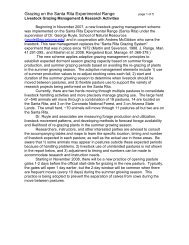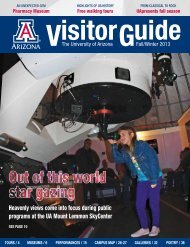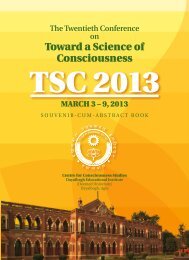CONSCIOUSNESS
Download - Center for Consciousness Studies - University of Arizona
Download - Center for Consciousness Studies - University of Arizona
- No tags were found...
Create successful ePaper yourself
Turn your PDF publications into a flip-book with our unique Google optimized e-Paper software.
1. Philosophy 55<br />
the universe, are adequately mapped to a definable set. That does not require a grand unified<br />
theory. There may be several overlapping theories, each with a certain range of application,<br />
which approximately describe the physical universe, as long as they are fine-grained enough<br />
to identify single physical states. Alternatively, a definable set of physical states is obtained<br />
by a point-by-point description of the model of physical theory, the total quantum state of<br />
the brain (or the universe). The conjunction of the above entails that human beliefs do not<br />
supervene on brain states. C5<br />
31 The Singularity: A Philosophical Analysis David Chalmers <br />
(Australian National University, Centre for Consciousness, Canberra, Australia)<br />
The technological “singularity”, or I.J. Good’s “intelligence explosion”, is the rapid transition<br />
from greater-than-human artificial intelligence to superintelligence. I will set out and<br />
analyze the argument for an “intelligence explosion”, and will consider the forms that such<br />
explosion might take. Focusing on the likelihood that it will take place within a simulated<br />
world, I will consider resulting practical and philosophical issues. How, if it all, can we control<br />
the impact of superintelligence in a simulated world on our world? Will systems in a<br />
post-singularity world be conscious? Can we be among them? PL6<br />
32 Consciousness in Mixed Systems: Merging Artificial and Biological Minds Via<br />
Brain-Machine Interface Alexandra Elbakyan (independent<br />
researcher, Almaty, Kazakhstan)<br />
The rapidly developing field of Brain-Machine Interface (BMI) technology seeks to establish<br />
a direct communication-and-control channel between human brain and machines. Practical<br />
applications for BMI include restoration of lost vision and motor functions, and even extending<br />
normal human capabilities. But unfortunately current BMI systems are far too poor to<br />
achieve even a level of performance that is comparable to what humans are normally capable<br />
of, let alone improving it. And this situation holds on for quite a while. The possible solution<br />
for coming out is to move research focus to those aspects of brain-machine interaction that<br />
usually do not receive much attention. The study of consciousness is one of such important<br />
aspects, as this talk seeks to prove, that could eventually allow us to bring BMI technology to<br />
the advanced stages, making its capabilities closer to capabilities of those BMI devices that<br />
appear in science fiction. Understanding consciousness and how it arises from the brain is<br />
crucial for achieving that goal. And BMI technology itself provides a lot of new questions and<br />
opportunities for consciousness research. BMI can progress far enough to allow such levels of<br />
integration between artificial devices and biological neural networks that they could work as<br />
a single system, not just separate entities communicating between each other. But how consciousness<br />
can then be represented in this mixed system? Will consciousness be privilege of<br />
living part only? Can the artificial part add something to conscious experience or even expand<br />
it? Furthermore, it would be possible to integrate neural systems of different living organisms<br />
by interfacing them to single artificial network. Will their consciousness be integrated then<br />
too? And how can such integrated mind be experienced? This talk explores ways in which<br />
Brain-Machine Interfaces can contribute to consciousness research, and discusses how better<br />
understanding of consciousness in context of brain-machine interaction will allow us to build<br />
BMI systems with extended capabilities. P1<br />
33 Consciousness And The Technological Demiurge Paul Evans <br />
(The Sapphire Institute, Charleston, SC)<br />
In this presentation transhumanism and the role of machines in consciousness are explored<br />
as the central Zeitgeist of the early 21st century.. Literary works of Paolo Bacigalupi, Robert<br />
J. Sawyer and the technical writing of Ray Kurzweil are examined in the light of today’s<br />
dominant movie genres and such films as Blade Runner, The Matrix, Terminator and Avatar.<br />
Also, emerging roles of virtual experience on Facebook, Second Life, and even modern drone<br />
warfare are suggested as vehicles for abstracting humans from face-to-face community and<br />
as surrogates for real life. The ideas that technological singularity will enable humans to be-







